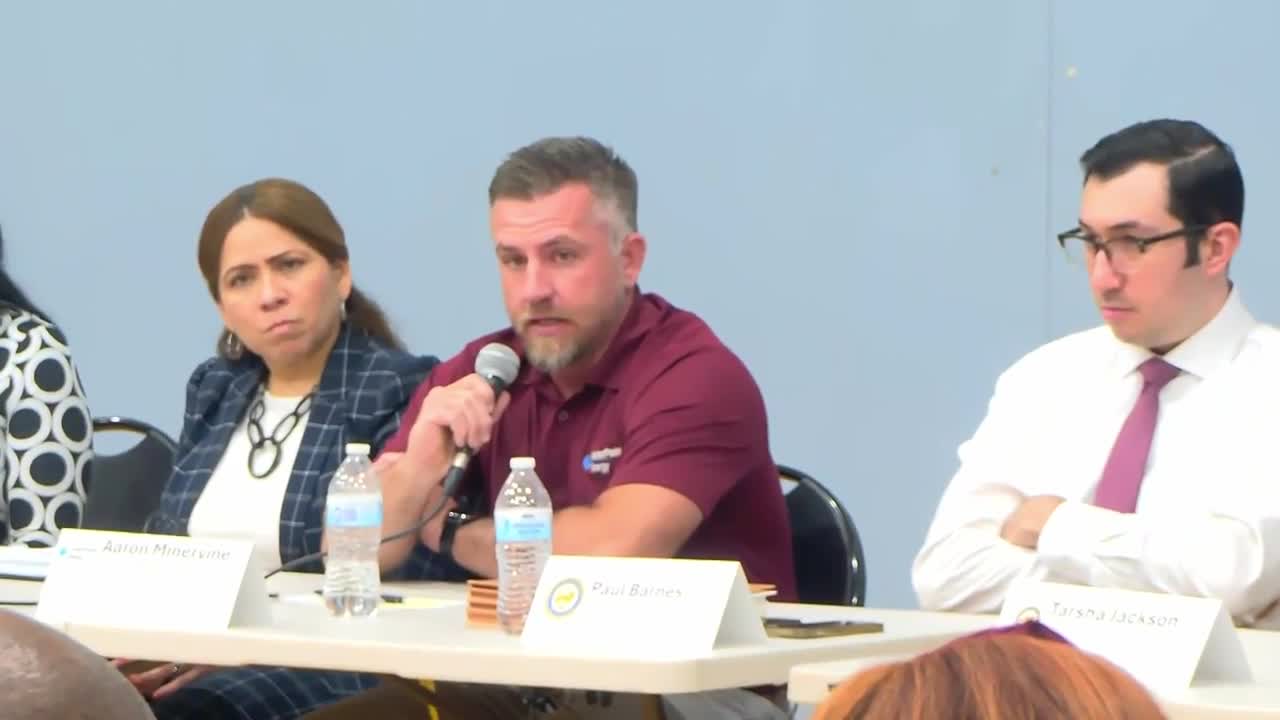CenterPoint, Metro and Public Works outline maintenance cycles, reporting tools and limits
October 02, 2025 | Houston, Harris County, Texas
This article was created by AI summarizing key points discussed. AI makes mistakes, so for full details and context, please refer to the video of the full meeting. Please report any errors so we can fix them. Report an error »

City and utility representatives at the District B forum described how residents can report service issues, what routine maintenance cycles look like and where authority and staffing limits apply.
Aaron Minterbeam, service area director for CenterPoint Energy, said CenterPoint does not routinely drive neighborhoods to spot outages; instead, the company relies on an outage-tracking system residents can use to report power loss. He described a feeder-line patrol cycle of roughly three to four years for larger lines and said vegetation and hazard-tree crews and service-area consultants report issues during routine work. Minterbeam also described a hazard-tree program to evaluate trees outside rights-of-way that may threaten lines.
A Metro representative said maintenance crews put stops on routine cleaning schedules and that the agency maintains more than 8,000 stops citywide; Metro asked residents to notify the agency or request MPD dispatch when shelters are occupied or present safety concerns so staff can clear and clean shelters. Veronica Lozama of Solid Waste Management and Transportation and Drainage Operations staff said street sweeping and mowing schedules vary by area and that some locations are cut more frequently when district service funds or management districts are present. Transportation and Drainage Operations staff offered to meet residents at a forum table to discuss specific ditch-mowing concerns.
Bobby Darden of 311 explained that 311 is an intake system that routes service requests to implementing departments and that case-status differences can occur where one system shows a case closed while the implementing department’s work order remains pending in CityWorks or other systems.
Aaron Minterbeam, service area director for CenterPoint Energy, said CenterPoint does not routinely drive neighborhoods to spot outages; instead, the company relies on an outage-tracking system residents can use to report power loss. He described a feeder-line patrol cycle of roughly three to four years for larger lines and said vegetation and hazard-tree crews and service-area consultants report issues during routine work. Minterbeam also described a hazard-tree program to evaluate trees outside rights-of-way that may threaten lines.
A Metro representative said maintenance crews put stops on routine cleaning schedules and that the agency maintains more than 8,000 stops citywide; Metro asked residents to notify the agency or request MPD dispatch when shelters are occupied or present safety concerns so staff can clear and clean shelters. Veronica Lozama of Solid Waste Management and Transportation and Drainage Operations staff said street sweeping and mowing schedules vary by area and that some locations are cut more frequently when district service funds or management districts are present. Transportation and Drainage Operations staff offered to meet residents at a forum table to discuss specific ditch-mowing concerns.
Bobby Darden of 311 explained that 311 is an intake system that routes service requests to implementing departments and that case-status differences can occur where one system shows a case closed while the implementing department’s work order remains pending in CityWorks or other systems.
View full meeting
This article is based on a recent meeting—watch the full video and explore the complete transcript for deeper insights into the discussion.
View full meeting
